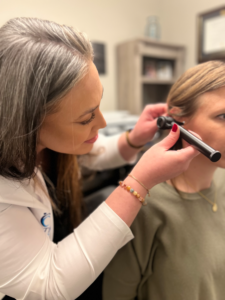by Dr. Kathleen Coates, Au.D., CCC-A, F-AAA
 There has been a great deal of research from 2015 to 2023 dedicated to investigating how hearing loss is connected with cognitive decline (dementia, Alzheimer’s, etc). Though some of my patients have told me that the results of this past research has caused them some nervousness, the newest research has also now provided HOPE.
There has been a great deal of research from 2015 to 2023 dedicated to investigating how hearing loss is connected with cognitive decline (dementia, Alzheimer’s, etc). Though some of my patients have told me that the results of this past research has caused them some nervousness, the newest research has also now provided HOPE.
One of our main missions in the clinic is taking the time to educate each patient on his or her specific hearing loss. Understanding hearing loss and its links with other health conditions allows us to treat a patient as a whole…not just with hearing aids. Doctors of Audiology are trained to provide this level of care as well as collaborate with primary care doctors, neurologists, cardiologists and other specialty physicians to ensure all risk factors of dementia have been discussed and evaluated.
One of the most common questions patients, loved ones and caregivers ask our Audiologists is, “How is hearing loss linked with cognitive decline?” There are many hypothesized mechanisms linking hearing loss and cognitive decline. They include cognitive overload, brain structure changes and reduced engagement in social and cognitively stimulating activities (Reference 3).
Another common question we get is, “I have hearing loss, so what can I do to prevent cognitive decline?” For many years, we would encourage patients to stay active, give general prevention resources and recommend education and involvement with groups such as the Dementia Alliance of NC. However, new research (released in the summer of this year) has shown the benefits of hearing aids specifically in reducing the incidence of cognitive decline.
The Lancet Commission on Dementia has identified hearing loss as being the single largest potentially modifiable risk factor for dementia (Reference 2). Treating hearing loss means better communication with loved ones, confidence in conversations, reduced self-imposed social isolation and improved quality of life.
An NIH-funded research team, co-led by Dr. Frank Lin from Johns Hopkins University, enrolled nearly 1,000 adults, ages 70 to 84, into a clinical trial. They compared the rate of cognitive decline over a three-year period between people who wore or did not wear hearing aids. When focusing on people from the heart-health study (who had a higher risk of dementia) the benefit of the hearing aids was substantial. Those who received hearing aids had an almost 50% reduction in the rate of cognitive decline (Reference 1).
That is great news! While we knew that there was a connection between hearing loss and dementia/Alzheimer’s, this new research shows that TREATMENT for hearing loss can reduce that risk! We are hoping that this research brings to light the importance of seeing an audiologist for a screening for hearing loss for everyone, especially those who are experiencing memory concerns. A comprehensive hearing evaluation with an Audiologist is one part of the battery of tests to diagnose cognitive decline. Our clinic has hosted community meetings with local senior centers, primary care doctors, cardiologists, neurologists and other groups to share this research and its importance. We are also hoping that writing blogs like this, presented by the Dementia Alliance, allows us to reach more and more people. Maybe you do not have hearing loss yourself, but hearing loss is very common, so I bet you know someone who does.
 Knowing that hearing aids can help reduce cognitive decline, where do we go from here? Start with an appointment with a Doctor of Audiology to complete a comprehensive baseline hearing evaluation if you are 55 and older. In the past, there were a couple of barriers to patients receiving hearing aids, including patient motivation/readiness and cost. Thankfully, during my time as an Audiologist over the past 10 years, we are starting to see these barriers getting knocked down. 75% of our patients have insurance that pays part (or all) of the cost of hearing aids or an insurance plan that offers a discount on the price of hearing aids.
Knowing that hearing aids can help reduce cognitive decline, where do we go from here? Start with an appointment with a Doctor of Audiology to complete a comprehensive baseline hearing evaluation if you are 55 and older. In the past, there were a couple of barriers to patients receiving hearing aids, including patient motivation/readiness and cost. Thankfully, during my time as an Audiologist over the past 10 years, we are starting to see these barriers getting knocked down. 75% of our patients have insurance that pays part (or all) of the cost of hearing aids or an insurance plan that offers a discount on the price of hearing aids.
Over the last few years, devices have gotten smarter and smaller. Hearing aids provide better sound quality, background noise reduction and automatic features like wind noise reduction. Audiologists are trained to fit devices for every patient’s individual ear for comfort, security/retention and long-term use. We use real ear verification measures that ensure the hearing aids are meeting prescription targets based on the audiogram (frequency-specific hearing loss).
There are many health insurance companies that have benefits or coverage for hearing aids. I cannot tell you how many times patients waited for years to get hearing aids (due to cost concerns), wishing they were fit with hearing aids sooner, not realizing that they had a health insurance benefit that would help with the cost. There are even local and state programs that can help with costs for patients who do not have health insurance benefits.
I hope this blog reaches someone who did not realize the connection of hearing loss with cognitive decline. Hopefully, it will make a difference in someone’s life. We are all in this together and, at Coates Hearing Clinic, we will continue to provide education, resources and research to better attack dementia and its impact on the lives of our patients, loved ones and caregivers.
References:
- Hearing intervention versus health education control to reduce cognitive decline in older adults with hearing loss in the USA (ACHIEVE): a multicentre, randomised controlled trial. Lin FR, Pike JR, Albert MS, Arnold M, Burgard S, Chisolm T, Couper D, Deal JA, Goman AM, Glynn NW, Gmelin T, Gravens-Mueller L, Hayden KM, Huang AR, Knopman D, Mitchell CM, Mosley T, Pankow JS, Reed NS, Sanchez V, Schrack JA, Windham BG, Coresh J; ACHIEVE Collaborative Research Group. Lancet. 2023 Jul 17:S0140-6736(23)01406-X. doi: 10.1016/S0140-6736(23)01406-X. Online ahead of print. PMID: 37478886.Hearing intervention versus health education control to reduce cognitive decline in older adults with hearing loss in the USA (ACHIEVE): a multicentre, randomised controlled trial. Lin FR, Pike JR, Albert MS, et al. Lancet 2023; published online July 18. doi: 10.1016/S0140-6736(23)01406-X
- N Mukadam et al. Population attributable fractions for risk factors for dementia in low-income and middle-income countries: an analysis using cross-sectional survey data Lancet Glob Health (2019)
- RV Wayne et al. A review of causal mechanisms underlying the link between age-related hearing loss and cognitive decline Ageing Res Rev (2015)


